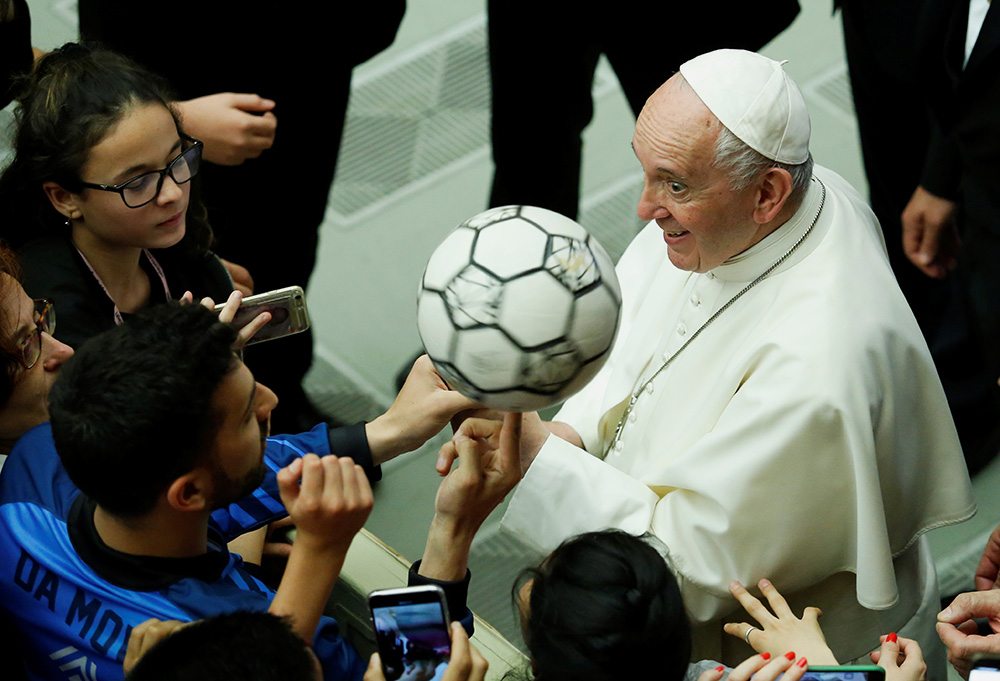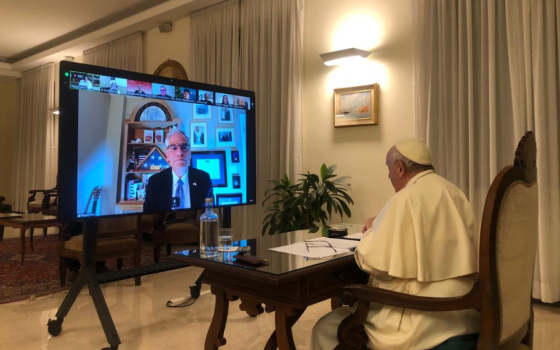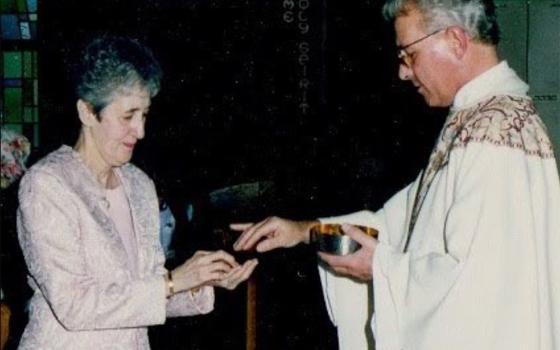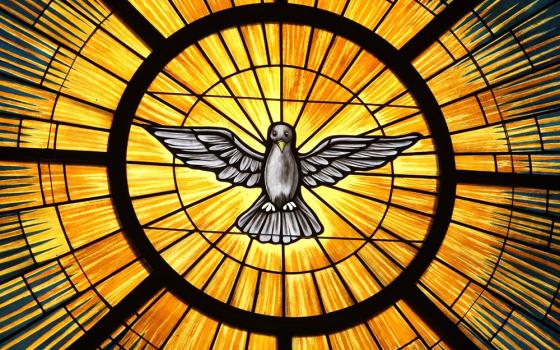
Pope Francis participates alongside thousands of young soccer athletes in a project to promote the values of sport and soccer at the Vatican May 24, 2019. (CNS/Reuters/Remo Casilli)
When it comes to sports, Pope Francis might best be described as a streetball player and a loyal fan. He is the kid whose enthusiasm for play far exceeds his talent. In pick-up soccer games, his teammates often designated him as goalie because, in his own words, he was a "pata dura," literally a "hard leg," an Argentinian colloquialism whose closest equivalent is having "two left feet." Like any number of poor children to this day, Francis grew up playing with "pelotas de trapo," improvised soccer balls made of rags because leather balls were too expensive. Such a ball was all one needed to "perform miracles" in his neighborhood plaza.
Details about Francis' youthful athleticism have surfaced throughout his pontificate, ranging from interviews like the one in 2015 with a reporter (himself formerly homeless) from the International Network of Street Papers, to the interview published Jan. 2, 2021, in association with the Italian daily newspaper La Gazzetta dello Sport and its weekend magazine Sportweek. The result of this extensive conversation, conducted at the Casa Santa Marta in early December 2020, has been appropriately called "una 'enciclica laica,' " a "secular encyclical" by his interlocutor, the journalist Pier Bergonzi.
From 2013 through the pandemic, Francis has well over 40 documented remarks on sport in audiences, letters and messages. He has released videos on the occasions of high-profile events like the 2014 World Cup in Brazil and Super Bowl LI in Houston in 2017.
He extended special greetings to athletes during general audiences in August 2016 before both the Olympics and the Paralympic Games. In November 2020, at his invitation, he met with officials and player representatives from the NBA Players Association. Their conversation focused on the role of sport as a messenger for the good in addressing social justice.
Francis is not the first pope to engage sport. Bishop Carlo Mazza observes that "pontiffs of the 20th century gave over 200 discourses (from simple greetings, to more elaborate speeches) … Pius X, 3; Benedict XV, 1; Pius XI, 5; Pius XII, 20; John XXIII, 9; Paul VI, 35; John Paul II, 120." In his study of Pope Benedict XVI, Bishop Josef Clemens expressed surprise at discovering that the theme of sports appears "in various ways no less than fifty occasions" during the first two and a half years of his pontificate.
Sports as a global phenomenon and a sign of the times makes a fleeting appearance as well in the documents of the Second Vatican Council (1962-65). Presenting options for the constructive use of leisure time "to relax, to fortify the health of soul and body," Gaudium et Spes proposes "sports activity which helps to preserve equilibrium of spirit even in the community, and to establish fraternal relations among people of all conditions, nations and races" (61).
For almost eight years, Francis has produced what might be understood as a "canon within a canon" when it comes to sports and his ongoing development of a theology of encounter. Themes that run throughout this unofficial canon are just as easily identifiable in Fratelli Tutti, which makes the timing and release of the Sportweek "secular encyclical" propitious. What he reveals in this interview is how sports, at every level, can function as a praxis of encounter, in other words, the spaces, places and opportunities where belonging, inclusion and solidarity are literally "played" out.
Advertisement
Francis links sports to identity and memory as key in cultural formation. He claims his local sports club as a part of his cultural identity. Club Atlético San Lorenzo de Almagro sponsored both soccer and basketball teams, the latter favored by his father. On numerous occasions, Francis has shared fond memories of family time at the soccer stadium, and regaled his NBA Players Association visitors with stories of watching the Harlem Globe Trotters in Buenos Aires in the 1950s.
Whether playing, cheering or remembering, for Francis, sports are about belonging. As part of the daily living of millions across the globe, "sport is the experience of the people and their passions, it marks personal and collective memory. Perhaps it is precisely these elements that allow us to speak of 'sporting faith.' "
Francis talks sports with a fan's enthusiasm and in a vernacular accessible to particular audiences. He perceives sports as a language and he is fluent in the patois of some sports, especially soccer. In 2013, he told the European Olympic Committee, "The language of sports is universal; it extends across borders, language, race, religion and ideology; it possesses the capacity to unite people, together, by fostering dialogue and acceptance." Fluency is a helpful intergenerational communication skill because, as he tells Bergonzi, "in sport the Christian communities have identified one of the most understandable grammars for speaking to young people."
In his 2014 World Cup video message to organizers, athletes and fans, he employs Brazilian soccer slang to underscore what is necessary for soccer to cultivate a "culture of encounter":
We must overcome individualism, selfishness, all forms of racism, of intolerance and of the instrumentalization of the human person. It is not only in football that being fominha [a selfish player who keeps the ball and doesn't pass it, ball hog] is an obstacle to positive results for the team. Because, in life, when we are fominhas, ignoring those who surround us, the entire society is damaged.
This language of sports allows for dialogue across differences, across religions and with people of goodwill who may not be religiously inclined. For Francis, that makes sports a means, a resource and even a metaphor for social transformation. Such transformation is possible with solidarity, a guiding principle in Fratelli Tutti that Francis sees concretely exhibited in sport. In the Bergonzi interview, he reiterates a thought briefly touched upon in his recent encyclical, namely, "we are either all saved together or no one is saved" (137). To this soteriological insight he adds, "Using a sports metaphor, we could say that we can only save ourselves as a team."
From the soccer pitch to the schoolyard to the stadium to the street, Francis never loses sight of the joy of play or of the wonder and celebration that athletic achievements can evoke. In a 2019 address to the Italian Soccer Federation and La Gazzetta dello Sport, he tells a story about an exchange between a journalist and a theologian. The journalist inquires how happiness could be explained to a child. "The theologian replies: 'I would not explain it, I would give them a ball to play.' This is happiness."
In the course of the recent interview, Francis was asked if he might consider writing an encyclical on sports. His response leaves open an intriguing possibility: "Perhaps this conversation can be defined as the start of an encyclical on sport. Let's see what God will suggest for the rest of the pontificate!" Judging from the wealth of the material available, both in this interview and in the body of his teachings on sports, Francis has a deep bench he can draw on.








